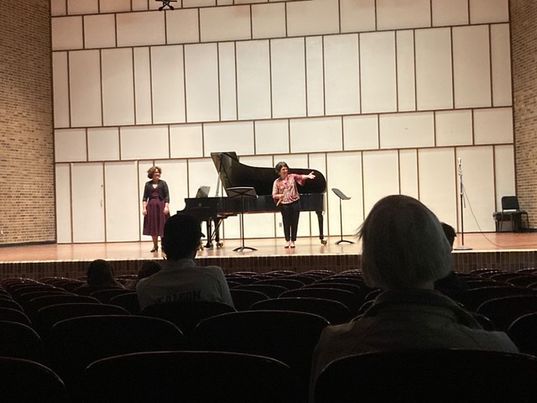
Three female UW-Whitewater professors and one student joined together to spread the legacies of female composers of both the past and the present. Their show, titled “Settling the Score: A Celebration of Music by Women,” showcased the musical talents of Dr. Cristina Ballatori, Dr. Diana Shapiro, and student Elizabeth Weber, while Dr. Vanessa Tonelli educated the audience about the background of each piece.
Ballatori, who chose the songs for the concert, explained she wanted pieces that encapsulated Women’s History Month and her own history with music.
“They’re all pieces that speak to me, or have spoken to me, throughout my career,” said Ballatori.
The concert, which happened on March 14 in Light Recital Hall, began with an introduction by Tonelli. The musicologist explained that women have not always been able to openly study and compose music.

(Katie Zee)
Tonelli quoted Clara Schumann, a 19th century composer, who said, “‘I once believed that I possessed creative talent, but I have given up this idea; a woman must not desire to compose—there has never yet been one able to do it. Should I expect to be the one?”’
The first song of the show was written by Lili Boulanger, who Tonelli described as a female composer whose life was cut short by a terminal illness. However, Boulanger was able to keep writing music, with the help of her sister, up until her death.
Boulanger, who lived from 1893-1918, wrote the piece titled “D’un matins de Printemps,” meaning “Of a Spring Morning.” It was written near the end of Boulanger’s life when she was 24 years old, according to Tonelli.
“She obviously was passionate about every single note and especially thoughtful of the tone colors that she used,” said Tonelli.
The next song of the program was “Town Light for Two Flutes and Piano” by Yuko Uebayashi. Uebayashi, born in 1958, was inspired by a close friend and fellow musician.
According to Tonelli, this piece exemplifies the idea that female composers often spark creativity in other composers.
“[Women] have always been integral to music as performers. Accordingly, many women composers turn to performers as inspiration for their works,” explained Tonelli.
“Sonatine for Flute et Piano” appeared next in the concert. It was written by Louise-Marie Simon, better known by her pen name of Claude Arrieu.
Simon was born in 1903 and died in 1990. According to Tonelli, she made strides in her career that earlier female composers were barred from because of their gender. Ballatori cited this piece as one of her favorites.
“It’s this very charming, uplifting little bonbon of a piece; and you would never have guessed that the Germans were occupying Marseille, where Arrieu was living and composing at the time,” Ballatori said.
The next song was a flute solo called “Homeland” by Allison Loggins-Hull, born in 1982. Tonelli described this piece, and Loggins-Hull’s other works, as being inspired by motherhood. “Homeland” in particular deals with motherhood during a time of tragedy.
Tonelli quoted Loggins-Hull saying, “‘What does home mean when the land has been destroyed?”’
The earliest piece in the program was written by Princess Amalie of Prussia, who lived from 1723-1787. Her piece, titled “Sonata in F Major for Flute and Piano,” and every piece she wrote or performed, was done secretly because of her father’s hatred for music.
“Only thanks to her mother, Queen Sophia Dorothea, was Anna Amalie able to clandestinely study music. She and her older brother would play flute duets with each other in secret,” explained Tonelli.
The last piece of the concert was written by Valerie Colman, born in 1970. She wrote “Legends for Flute and Piano” based on the mythology and traditions of varying countries such as Greece, Ireland, and Spain.
Tonelli quoted Colman, saying that her work was inspired by ‘“The shared qualities of human behavior, what feeds the soul, what identifies the issues of all the complexities within ourselves as human beings.’”
Coming up next at Light Recital Hall? “Music Mosaics Faculty Piano Trio,” which includes Shapiro. The concert will be held April 2, 7:30 p.m. to 8:30 p.m.

